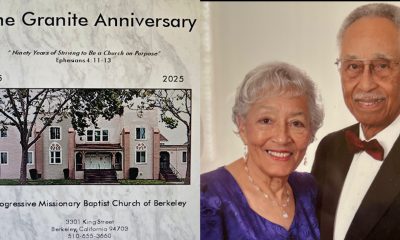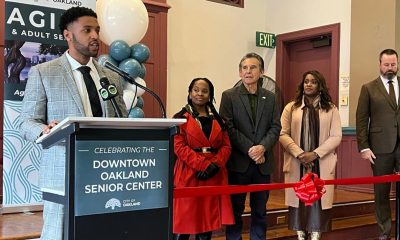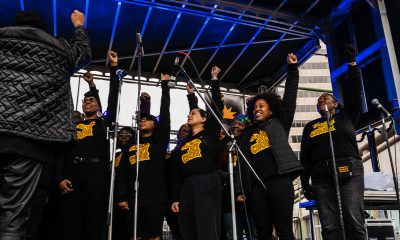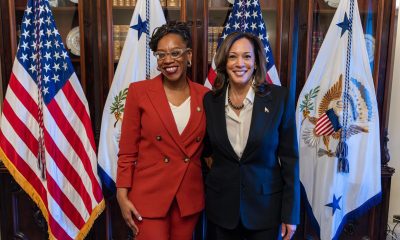Berkeley
Opinion – Black Berkeleyans Demand a Response to the Adeline Corridor Plan

This statement was made to the Berkeley Planning Commission’s special meeting on the Adeline Corridor Plan on Sept. 16, 2020, represented as a “long-range…blueprint for the future,” which many “black” Berkeleyans are suspicious of.
Since Mr. Lee believes that the dangerous mythology of “race,” which has no basis in science, is the root of the even more dangerous reality of racism, he has enclosed all “racial” terms in quotes so as not to legitimize either.
Good evening.
Malcolm X said: If you stick a knife in my back nine inches and pull it out six inches, that’s not progress. If you pull it all the way out, that’s not progress — because it won’t heal the wound that the blow made.
I’m not only speaking for myself, but I’m also presuming to speak for my fellow native “Black” Berkeleyans who aren’t joining this meeting because they don’t have the proper technology; because they’re intelligent enough to have lost faith in Berkeley’s pro-developer, gentrifier-friendly city government; or because, like most of us, they’ve been displaced and exiled against their will to Godforsaken cultural wastelands like Antioch and Pittsburg.
White Power and Us
The presence of “Black” and other non-“white” people in Berkeley had everything to do with the machinations of White Power and nothing whatever to do with the wishes of those of us who were herded into South and West Berkeley by redlining and restricted to these districts by the Berkeley Police Dept.
Likewise, the progressive disappearance of “Black” and other non-“white” people from Berkeley is mostly due to the insidiousness of White Power and has very little to do with our preferences.
Thus, our existence in this city is defined by our being pushed around by White Power, which obligates me to do my best to speak truth to this power.
The Lasting Wound
Despite the best efforts of “Black” community leaders to avoid our community being ravaged like majority-“Black” districts in Oakland were when BART was built in Berkeley in the late 1960s and early 1970s, the Ashby Station drove right through the vital beating heart of the city’s northern non-“white” commercial and cultural district, which was known as South Berkeley Square
It ran down Grove Street, now Martin Luther King, Jr. Way, from Woolsey to Ashby.
This was tantamount to slicing thru our jugular vein. “Black” and other non-“white” businesses bled out to Sacramento Street and to East Oakland.
“Black” Berkeley, in particular, never recovered from the destruction wrought by creating a convenience for “white” people at the expense of a non-“white” district.
Berkeley Community Flea Market
Ironically, the Berkeley Community Flea Market occupies the very spot of this devastating economic, cultural and social violation.
Quite appropriately, the market faithfully mirrors and sustains the rich ethnic diversity, innovative entrepreneurial spirit and strong sense of community kinship that made historic non-“white” Berkeley such a unique and beloved home for people like myself, which managed to thrive in the face of the historic racism of the rest of this supposedly “progressive” city, which fought tooth and nail to integrate its schools and didn’t do so until 1969.
Who Deserves Help?
When I was in high school, I taught beginners’ swimming to elementary school students. Whenever I had to choose between extending a helping hand to a child with a flotation device and one without one, I naturally reached for the latter.
That’s what “white” privilege in Berkeley and throughout the country does for “white” people — it sustains them and keeps their heads above water.
Not only do “Black” people lack this protection, but they’re also pulled to the bottom by the weight of the ongoing operations and legacy of “white” supremacy, which is currently experiencing a resurgence, including in Berkeley, where outsiders and newcomers presume to dictate to its historic “Black” residents, even though, relatively speaking, most of them arrived here only yesterday afternoon.
Two Demands
So it adds insult to injury that we have to come before this body to ask for — no, to demand — the simple justice of the right of return for exiled “Black” Berkeleyans and the re-establishment of non-white,” and particularly “Black,” businesses and cultural institutions, including the protection and promotion of the flea market.
The city and BART must understand that those of us who are exiled from our home remain vitally interested in and committed to it. We not only want to come home, but we deserve to.
However, as the Portland, Ore., plan proved, the right of return is meaningless if people are offered homes that they can’t afford.
Therefore, any housing built at the Ashby BART station — which, I should emphasize, is not what the “Black” community wants — must be 100% affordable for those of us who were forced out of our community because of the harm that was inflicted by BART and the city.
Similarly, the flea market must not be shunted off to the side, where it will eventually die a quiet, unceremonious death. Instead, just as it’s the beating heart of what’s left of non-“white” Berkeley, it should also be the seed of this special community’s economic and cultural rebirth.
If the Adeline Corridor Plan does not do these two things, it’s not worth the paper that it’s printed on.
Confirmation?
Indeed, it will be read by “Black” and other non-“white” Berkeleyans, both those who’ve managed to remain and those who were forced out, as yet another in a long train of racist subterfuges — merely sealing the destruction, displacement and disempowerment that began with the building of the Ashby BART station.
Moreover, failing to do these two things would also confirm our worse experiences of and fears about Berkeley’s endemic, systemic racism and make us question if we have a future in a city that’s mostly led by politicians who say all the right things and do all the wrong things and, through their actions, are consigning us to the fate of the Ohlone, whose land this truly is.
Thank you for your kind consideration.
Paul Lee, Exiled South Berkeleyan
Arts and Culture
Farwest Region Deltas Celebrate Centennial With “September Breakfast” Honoring Vivian Osborne Marsh
The region was established in 1925 under the leadership of Vivian Osborne Marsh, who became its first Regional Director. Marsh was a pioneering scholar and civic leader, earning recognition as the first Black woman to receive both a bachelor’s and a master’s degree in anthropology from UC Berkeley.
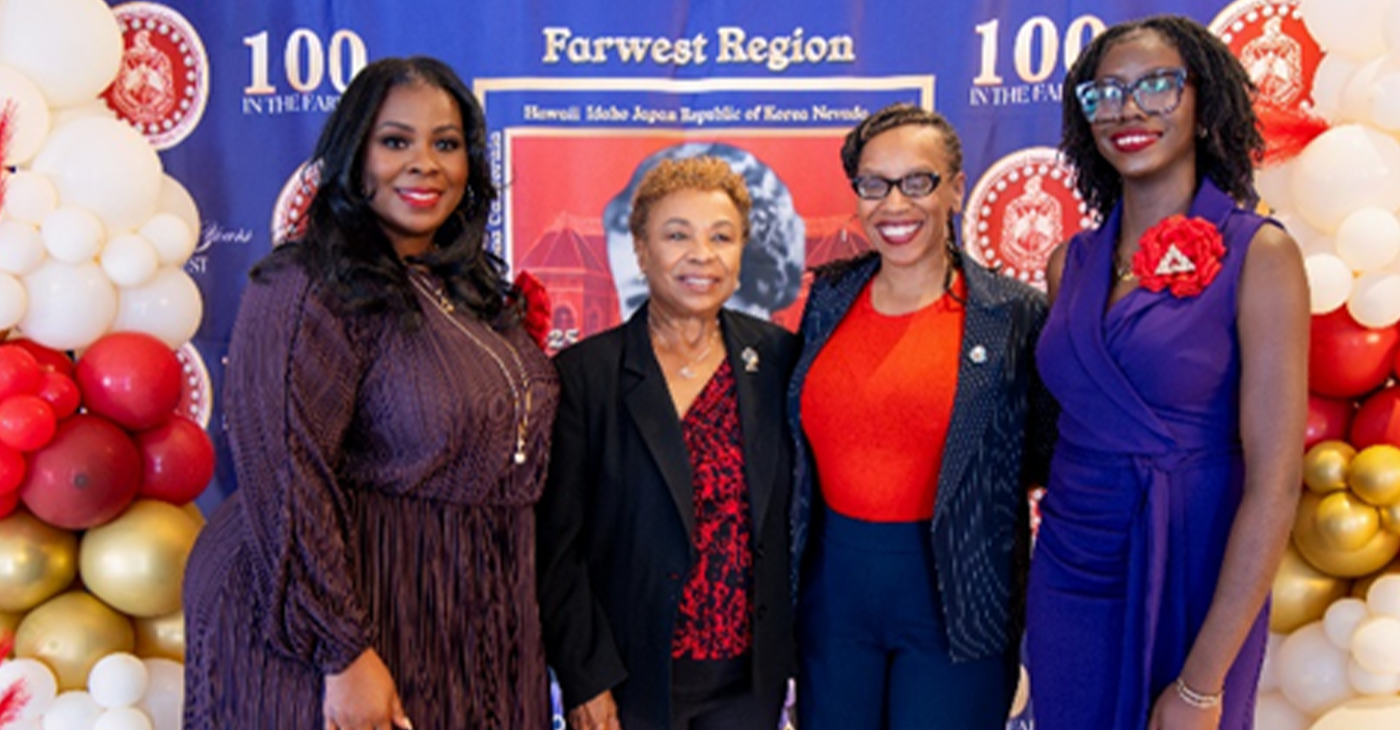
By Antoinette Porter
Hundreds of members of Delta Sigma Theta Sorority, Inc., and their guests gathered at the Martin Luther King Jr. Student Union at the University of California, Berkeley, to mark the 100th anniversary of the sorority’s Farwest Region.
The region was established in 1925 under the leadership of Vivian Osborne Marsh, who became its first Regional Director. Marsh was a pioneering scholar and civic leader, earning recognition as the first Black woman to receive both a bachelor’s and a master’s degree in anthropology from UC Berkeley.
Marsh went on to serve as Delta Sigma Theta’s 7th National President, where she launched the sorority’s National Library Project to expand access to books in underserved Black communities in the South. During her presidency, the organization also became a prominent voice in the civil rights movement, lobbying Congress to pass anti-lynching legislation.
Bak in the Bay Area, Marsh devoted her career to advancing educational opportunities, mentoring young people, and strengthening community life. That commitment continues to shape the region, which supports initiatives in education, social justice, and economic development. Current projects include raising scholarship funds for students at Historically Black Colleges and Universities, voter education campaigns, and health and wellness programs.
A century after its founding, the Farwest Region of Delta Sigma Theta remains active across California and other western states, carrying forward Marsh’s vision of service and advocacy.
Arts and Culture
Cal Performances Presents Angélique Kidjo & Yo-Yo Ma in Sarabande Africaine at UC Berkeley Greek Theatre on Aug. 30
On Saturday, Aug. 30, the pair will debut the Bay Area premiere of Sarabande Africaine, joined by pianist Thierry Vaton, percussionist David Donatien, and special guest Sinkane. The program illuminates centuries of musical interplay between African traditions and Western classical forms, using the Baroque sarabande dance, and its African ancestor, the Congolese spirit dance Zarabanda, as a gateway to exploring the deep, interconnected roots of global music.
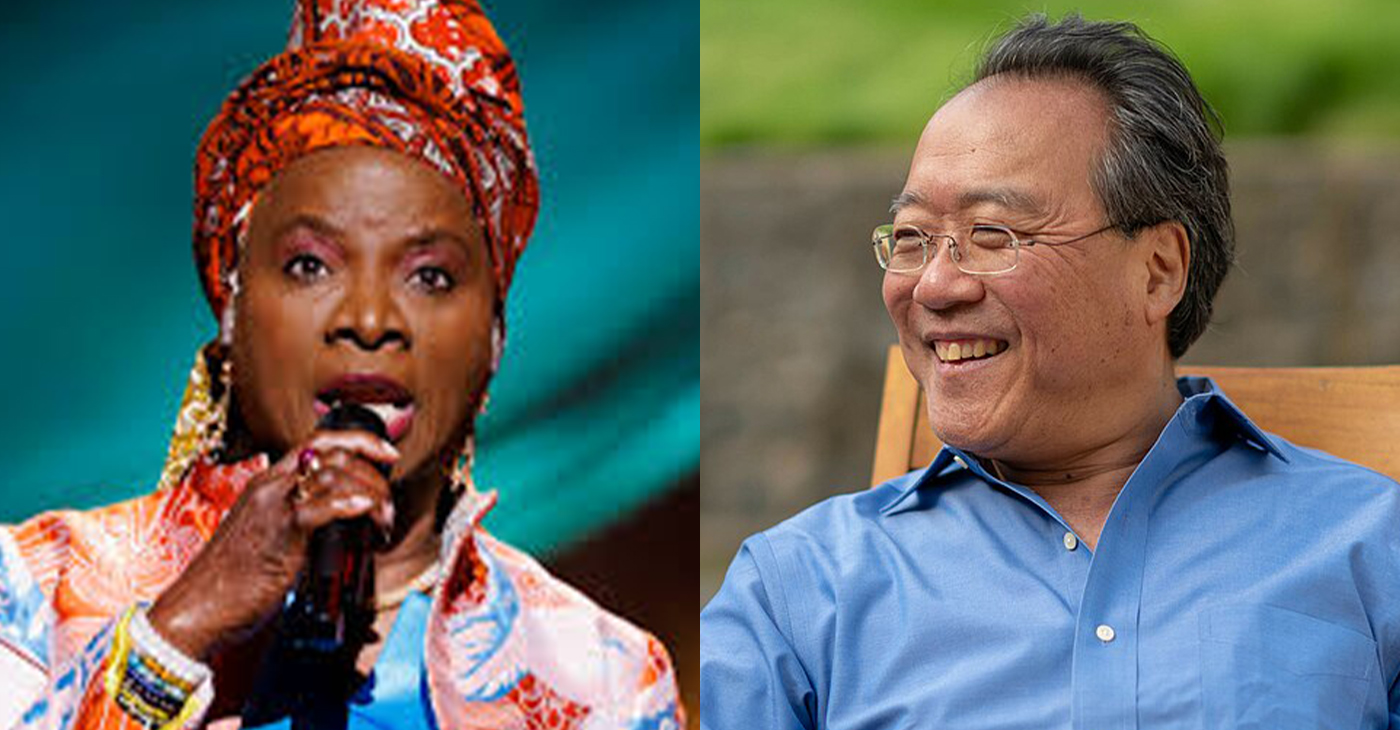
By Carla Thomas
On Labor Day weekend two of the world’s most celebrated musicians and cultural ambassadors, Grammy Award–winning vocalist Angélique Kidjo and legendary cellist Yo-Yo Ma join forces for an evening of music, history, and cultural dialogue at UC Berkeley’s historic Hearst Greek Theatre.
On Saturday, Aug. 30, the pair will debut the Bay Area premiere of Sarabande Africaine, joined by pianist Thierry Vaton, percussionist David Donatien, and special guest Sinkane. The program illuminates centuries of musical interplay between African traditions and Western classical forms, using the Baroque sarabande dance, and its African ancestor, the Congolese spirit dance Zarabanda, as a gateway to exploring the deep, interconnected roots of global music.
Both Kidjo and Ma have built careers not only as great performers but as passionate advocates for cultural understanding. Sarabande Africaine is as much a conversation about shared heritage as it is a musical performance, blending genres, geographies, and histories.
“Every day there are moments when all of us can feel we are on the inside of something and also when we feel we are on the outside of something,” said Yo-Yo Ma. “To be able to understand both at the same time and oscillate between the two gives us a larger perspective on the world.”
“If your mind is open, and there is no fear, it’s easier to listen, and to question yourself,” said Kidjo.
The upcoming performance is presented within Cal Performances’ Illuminations: “Exile & Sanctuary” series for the 2025–26 season. The production explores exile as more than just physical displacement, but a disruption in identity and belonging, while sanctuary represents both refuge and the creative space where new connections and communities can take shape.
Cal Performances’ Illuminations bridges performances with UC Berkeley’s academic research, pairing the arts with conversations about urgent global issues.
Kidjo’s continued partnership with Cal Performances includes her 2021–22 artist-in-residence, premiering her music-theater work Yemandja, set in 19th-century West Africa during the transatlantic slave trade.
She also participated in the Bias in Our Algorithms and Society panel alongside campus leaders like Jennifer Chayes, and joined the Black Studies Collaboratory for a dialogue on music, diaspora, and the world.
She has since returned to Berkeley for multiple performances, most recently in 2024 at Zellerbach Hall.
Yo-Yo Ma’s history with Cal Performances spans decades, beginning in 1997. One notable project includes the 2018 performance of Bach’s complete cello suites at the Greek Theatre, a testament to his devotion to creating “transformative concert experiences in iconic spaces.”
For tickets and more information, visit calperformances.org.
Activism
The Case Against Probate: False Ruling Invalidates Black Professor’s Estate Plan, Ignoring 28-Year Relationship
Zakiya Folami Jendayi, beneficiary of Head’s estate, states that “The errors, ranging from misstatements of fact, omissions of critical evidence, and reliance on false arguments and testimony, formed the basis of Judge Sandra K. Bean’s ruling against me, Dr. Head’s previous student, mentee, sorority sister and long-time friend,and despite the fact that I was her chosen, power of attorney, Advanced Healthcare Directive agent, trustee, executor and sole beneficiary.”

By Tanya Dennis
Part 5
In a shocking miscarriage of justice, a California probate judge issued a Statement of Decision on March 28 riddled with numerous documented errors that invalidated the estate plan of esteemed Black Studies professor Dr. Laura Dean Head.
The ruling from the Alameda County Superior Court’s probate division in Berkeley has sparked outrage from advocates for probate reform, community members and civil rights activists, who say the decision reflects deep flaws in the probate system, blatant disregard for due process, and the wishes of the ancestors. Judge Sandra Bean’s ruling reflects a repeated outcome seen in Black and Brown communities.
Zakiya Folami Jendayi, beneficiary of Head’s estate, states that “The errors, ranging from misstatements of fact, omissions of critical evidence, and reliance on false arguments and testimony, formed the basis of Judge Sandra K. Bean’s ruling against me, Dr. Head’s previous student, mentee, sorority sister and long-time friend,and despite the fact that I was her chosen, power of attorney, Advanced Healthcare Directive agent, trustee, executor and sole beneficiary.”
Reading court transcripts, the most egregious violations according to Jendayi reveal a pivotal point in the ruling that rested on a letter from Dr. Stephan Sarafian of Kaiser Permanente, who misidentified Dr. Head as male, misstated the day, month, and year, and asserted Head lacked capacity.
Under cross-examination, he reversed his opinion and admitted under oath that he never conducted a mental evaluation, did not diagnose Dr. Head with incapacity, did not write the letter, and stated he merely signed it “in case it was needed in the future.”
Despite Sarafian’s perjury, on Oct. 17, 2024, the California Court of Appeal upheld the lower court decision that relied on Sarafian’s discredited letter to invalidate Dr. Head’s estate plan, ignored Jendayi’s requests to impeach his testimony and dismiss Sarafian’s testimony and letter that both the Kaiser Grievance Department and the Medical Board of California denounced.
In her ruling, Judge Bean agreed with the false argument by attorney Leahy, which alleged that Jendayi provided the names of the beneficiaries to Head’s estate attorney, Elaine Lee. Bean made this decision despite Lee’s sworn testimony that Dr. Head had met with her alone, behind closed doors, and made the independent decision to leave her estate to Jendayi.
According to court records, Judge Bean reversed the burden of proof in the undue influence claim before any of Jendayi’s witnesses testified, forcing Jendayi to disprove allegations that were never substantiated by witnesses or records.
Bean ruled: “Respondent took Dr. Head to her apartment where she assumed complete control of Dr. Head’s day-to-day care, medical care, and all aspects of her life.” Jendayi proved that statement was false.
Bean also ruled that Respondent controlled Dr. Head’s necessities of life, food, and hospice care, despite zero testimony or documentation supporting any of those claims.
The court reduced Jendayi’s role to “a friend who, at best, cared for Dr. Head during the final two months,” totally ignoring 28 years of friendship, testimony, evidence, letters of recommendation, emails, and medical records.
Exhibits confirming Dr. Head’s intent and capacity, including the discredited medical letter, Exhibit 90, were omitted or misrepresented in the judge’s final decision.
Jendayi says, “The injustice within the probate justice system is devastating, traumatizing and financially depleting. It’s nothing short of legalized crime!”
Jendayi is now appealing to the Supreme Court of the U.S. with a petition citing denial of due process, judicial misconduct, and systemic bias in probate courts.
-

 Activism4 weeks ago
Activism4 weeks agoIN MEMORIAM: William ‘Bill’ Patterson, 94
-

 Activism4 weeks ago
Activism4 weeks agoOakland Post: Week of November 19 – 25, 2025
-

 #NNPA BlackPress3 weeks ago
#NNPA BlackPress3 weeks agoLIHEAP Funds Released After Weeks of Delay as States and the District Rush to Protect Households from the Cold
-

 #NNPA BlackPress4 weeks ago
#NNPA BlackPress4 weeks agoBeyoncé and Jay-Z make rare public appearance with Lewis Hamilton at Las Vegas Grand Prix
-

 Alameda County2 weeks ago
Alameda County2 weeks agoSeth Curry Makes Impressive Debut with the Golden State Warriors
-

 Activism3 weeks ago
Activism3 weeks agoOakland Post: Week of November 26 – December 2, 2025
-

 #NNPA BlackPress3 weeks ago
#NNPA BlackPress3 weeks agoSeven Steps to Help Your Child Build Meaningful Connections
-

 #NNPA BlackPress4 weeks ago
#NNPA BlackPress4 weeks agoLewis Hamilton set to start LAST in Saturday Night’s Las Vegas Grand Prix



